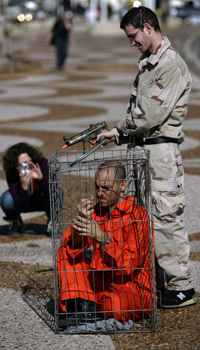Secretive US hearings raise concern
“High value” Guantanamo inmates to face US military panels without lawyers.

Floyd Abrams, a first amendment lawyer, called the decision to close the hearing “a mistake” after the Pentagon made the announcement on Tuesday.
He said: “Closing the courtroom to scrutiny sends a troubling signal to much of the world about the fairness of our process.”
Scott Silliman, who was a US air force lawyer for 25 years, said: “The whole world is watching. If congress enacts what it claims to be a fair system for prosecuting these people, why is there a need to shield it from the press?”
| Your Views |
|
“Guantanamo shows disrespect for human rights and should be closed” |
Bryan Whitman, a Pentagon spokesman, said the hearings were closed to prevent classified information from leaking.
Whitman said the Pentagon will release a redacted transcript of the proceedings as soon as possible and post it on a Pentagon website along with an unclassified summary of the evidence against the detainees.
Officials would not say which of the 14 would go first, how many have refused to take part in the proceedings and declined to offer a schedule for the hearings.
Initially, the Pentagon planned to withhold the names of the detainees from the transcripts, but later reconsidered.
The status review panels are not attempting to rule on an inmate’s guilt or innocence. But a decision to keep the suspects under detention is expected to pave the way for formal trials on terrorism charges before special military tribunals created by the US congress under a controversial law.
Previous reviews
The other 370 Guantanamo detainees have all passed through similar status review boards, in which a shackled prisoner, without a legal advocate, is presented with a brief summary of the allegations he faces.
Only rarely in the status review procedures have detainees been able to cite witnesses or offer documents in their favour.
The Pentagon says such a procedure permits the US to balance the threat posed by the suspects and the desire not to hold them in custody longer than necessary.
International criticism
George Bush, the US president, has come under severe international criticism for holding detainees without charges at the naval base in Cuba amid allegations of abuse and torture.
|
|
| Human rights groups frequently protest against the jail [AFP] |
Human rights groups and European governments have condemned the detention camp as flouting fundamental civil liberties and demanded the prison be closed.
Some legislators in the Democratic-controlled US congress have also called for closing the camp and possibly transferring some detainees to prisons on the US mainland.
Lawyers for Majid Khan, one of the 14 suspects, have condemned the hearings and said their client was subjected to “enhanced interrogation techniques” amounting to torture while in a secret CIA prison.
The Center for Constitutional Rights, which is organising the defence of hundreds of Guantanamo detainees including Khan, said it was “outrageous” that he had not seen his lawyers since October.
Barring access to his lawyers was designed to “prevent torture and abuse from becoming public, and to protect any foreign governments who may have assisted or been complicit in Khan’s secret detention,” the CCR said.
